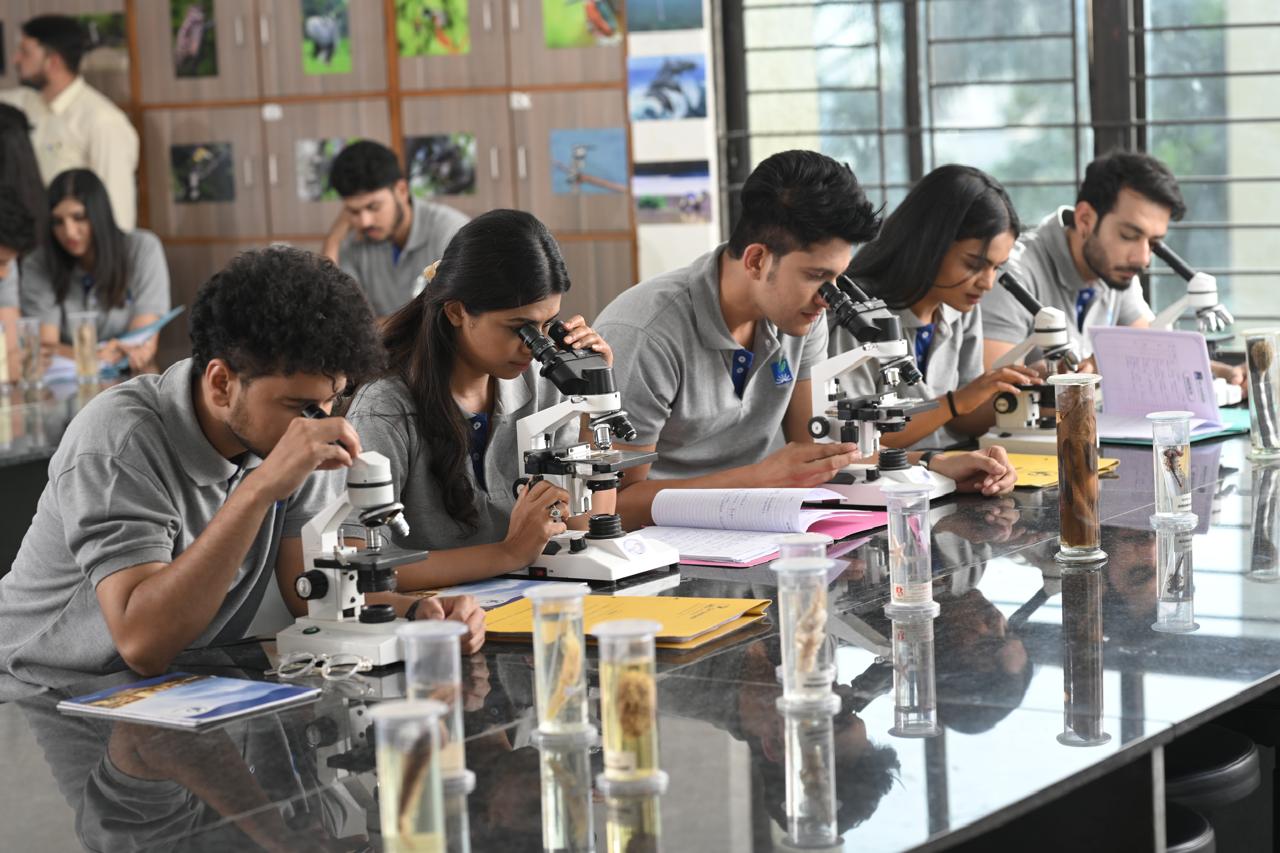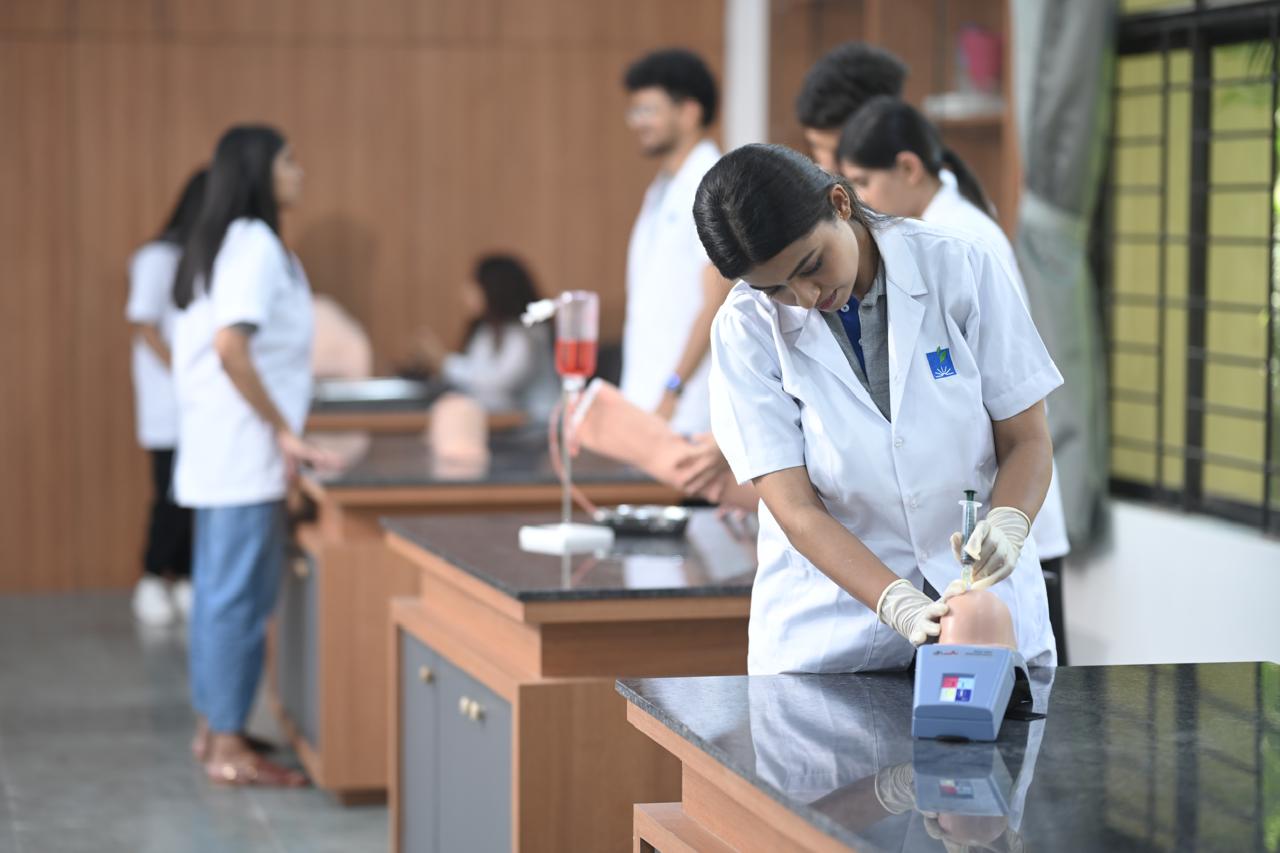Zoology
From Creatures to Conservation: Master B.Sc. Zoology at the Best Private University in Junagadh
Introduction to course
The Department has highly qualified, experienced, and dedicated faculty with an average teaching experience of more than 3 years. Our pedagogy focuses on basic and applied fields of Zoology assisted with demos, models, videos, etc. The Departmental laboratories include-a wet laboratory having equipment such as Digital Weighing Balance, pH Meter, Shaking Magnetic Hot Plate, Compound Microscopes, light Microscope, Water Bath, Distillation Plant, Microtome, Shaker, Centrifuge, Hot Air Oven, Incubator, etc. We have Permanent Slides, Specimen, and Models of all the phylum we teach in the subject syllabus, The Department has a state of the Computer Laboratory for the utilization of e-resources and demonstration of dissections and use for the Project and dissertation work, also we have Different Software like environmental assessment Software, biodiversity Assessment like Diversity, Distribution and Population Ecology Study.
A graduate degree in Zoology opens a vast range of career opportunities in the field such as Teaching and Research, Forensics, Indian Forest Services, Indian Administrative Services, including working as zoo curators, museum curators, animal and wildlife educators, wildlife rehabilitators, and conservationists, Research Project assistants and in higher specialized studies. The career opportunities for a postgraduate in Zoology are limitless. Some of the employment areas which provide huge openings for the M.Sc. Zoology candidates are medical laboratories, wildlife rehabilitation centers, hatcheries, agricultural departments, museum services, conservation agencies, scientific civil services, environment or ecosystem management sector, environmental consulting firms, and so on. In addition, there are numerous opportunities in the field of research in India and abroad.
Mission
- Conduct cutting-edge research to expand the frontiers of biological and environmental science, fostering innovation and developing sustainable solutions.
- Provide high-quality, student-centered education that empowers graduates with the knowledge, skills, and ethical values necessary to excel in their careers and contribute meaningfully to society.
- Promote collaborative research and education across disciplines to address complex biological and environmental challenges and drive innovative solutions.
- Engage with local, national, and global communities to apply scientific knowledge for the betterment of society and the environment, promoting sustainability and ethical responsibility in biological science.
- Uphold principles of sustainability and ethical responsibility in all aspects of research, education, and community involvement, contributing to a more equitable and sustainable future.
Vision
To be a centre of excellence in Life Sciences, fostering innovation, interdisciplinary
collaboration and ethical research to address pressing global challenges and create
a sustainable future

Course objective
Zoology courses are a preferred choice of those who feel an affinity towards caring for the creatures of the animal kingdom. While a bachelor’s degree gives an all-encompassing understanding of the branches of Zoology many feel the need to dig deeper and explore the immensely vast animal world.
Furthermore, with the need for animal and nature conservation becoming more than ever before, the demand for individuals who are aware of the issues prevalent in this field and possess expertise in integrating technology with Zoology has also soared.
Course outcome
B.Sc. Zoology graduates can explore a plethora of jobs in the government sector, especially in research, forestry, and environmental management, amongst others. Listed below are the top government jobs after B.Sc. Zoology:
Research Officer, Forest Officer, Project Manager, Laboratory Assistant, Associate, Professor, Entomologist, Information Officer, Technical Officer, Medical Officer, Environmental Consultant, Research Scientist, Marine Biologist, Lecturer/Professor, Conservation Officer, Animal Behaviorist, Zoo Officer, Ecologist, Toxicologist, Animal Nutritionist
- To develop the infrastructural facility and introduce tools and techniques in relevant fields.
- To undertake graduation-level Dissertation and projects in different fields and conduct quality research in frontier areas.
- To publish high-quality research papers in different fields.
- To produce leadership in biological science and technology.
- To prepare responsible trained manpower in Marine Biology, Wild Life, Aquaculture and animal sciences, teaching, and research.
- To organize So many Social Activities for animal welfare, conservation, and protection of biodiversity.
- To provide transformative, holistic, and value-based immersive learning experiences to students.
Admission procedure
Eligibility:
- The student who has qualified HSC or equivalent examination in Science stream from recognized board or body is eligible for admission in B.Sc. programme.
|
Board |
Category |
Theory Marks |
Theory + Practical Marks |
|---|---|---|---|
|
GSEB |
Open |
135 / 300 |
180 / 400 |
|
GSEB |
Reserve |
120 / 300 |
180 / 400 |
|
Other Boards |
Open |
108 / 240 |
135 / 300 |
|
Other Boards |
Reserve |
96 / 240 |
120 / 300 |
Admission Process:
- A candidate has to fill an online application form with all the necessary details in the due time declared by the university.
- After the last date of application, the University shall publish the merit lists of selected candidates. The candidate has to pay the necessary fees within prescribed time duration to confirm his/her seat.
- The merit for admission will be based on total obtained marks including that of practical marks in HSC or equivalent examination.
- If two or more candidates have acquired equal marks in HSC or equivalent examination, then marks of SSC examination will be considered.
- The candidate who has submitted necessary documents of authorized signatory in light of reservation is eligible to avail the benefit of reservation policies.
- The candidate who has qualified HSC or equivalent examination from the board other than GSHEB, has to obtain a provisional eligibility certificate and has to submit a copy of the same along with his/her application.
- Candidates have to submit the following documents with their application.
- SSC Mark sheet
- HSC Mark sheet
- Leaving Certificate
- Two passport size photographs
- Caste Certificate (if applicable)
- Non-creamy layer certificate (if applicable)
- EWS certificate (if applicable)
- Certificate for PH category (if applicable)
- Provisional Eligibility Certificate (if applicable)
- Other necessary documents suggested by the admission committee.
- In case of any query, the decision of the admission committee will be considered as the final.
Curriculum
- Duration: 4 years
- Fees: Rs. 70,000
- Intake: 60
| GTU Code | Subject | Theory(Hrs) | Tutorial(Hrs) | Practical(Hrs) | Credits |
|---|---|---|---|---|---|
| 3110000 | Lorem Ipsum | 0 | 0 | 0 | 0 |
| 3110000 | Lorem Ipsum | 0 | 0 | 0 | 0 |
| 3110000 | Lorem Ipsum | 0 | 0 | 0 | 0 |
| 3110000 | Lorem Ipsum | 0 | 0 | 0 | 0 |
| 3110000 | Lorem Ipsum | 0 | 0 | 0 | 0 |
| GTU Code | Subject | Theory(Hrs) | Tutorial(Hrs) | Practical(Hrs) | Credits |
|---|---|---|---|---|---|
| 3110000 | Lorem Ipsum | 0 | 0 | 0 | 0 |
| 3110000 | Lorem Ipsum | 0 | 0 | 0 | 0 |
| 3110000 | Lorem Ipsum | 0 | 0 | 0 | 0 |
| 3110000 | Lorem Ipsum | 0 | 0 | 0 | 0 |
| 3110000 | Lorem Ipsum | 0 | 0 | 0 | 0 |
| GTU Code | Subject | Theory(Hrs) | Tutorial(Hrs) | Practical(Hrs) | Credits |
|---|---|---|---|---|---|
| 3110000 | Lorem Ipsum | 0 | 0 | 0 | 0 |
| 3110000 | Lorem Ipsum | 0 | 0 | 0 | 0 |
| 3110000 | Lorem Ipsum | 0 | 0 | 0 | 0 |
| 3110000 | Lorem Ipsum | 0 | 0 | 0 | 0 |
| 3110000 | Lorem Ipsum | 0 | 0 | 0 | 0 |
| GTU Code | Subject | Theory(Hrs) | Tutorial(Hrs) | Practical(Hrs) | Credits |
|---|---|---|---|---|---|
| 3110000 | Lorem Ipsum | 0 | 0 | 0 | 0 |
| 3110000 | Lorem Ipsum | 0 | 0 | 0 | 0 |
| 3110000 | Lorem Ipsum | 0 | 0 | 0 | 0 |
| 3110000 | Lorem Ipsum | 0 | 0 | 0 | 0 |
| 3110000 | Lorem Ipsum | 0 | 0 | 0 | 0 |
| GTU Code | Subject | Theory(Hrs) | Tutorial(Hrs) | Practical(Hrs) | Credits |
|---|---|---|---|---|---|
| 3110000 | Lorem Ipsum | 0 | 0 | 0 | 0 |
| 3110000 | Lorem Ipsum | 0 | 0 | 0 | 0 |
| 3110000 | Lorem Ipsum | 0 | 0 | 0 | 0 |
| 3110000 | Lorem Ipsum | 0 | 0 | 0 | 0 |
| 3110000 | Lorem Ipsum | 0 | 0 | 0 | 0 |
| GTU Code | Subject | Theory(Hrs) | Tutorial(Hrs) | Practical(Hrs) | Credits |
|---|---|---|---|---|---|
| 3110000 | Lorem Ipsum | 0 | 0 | 0 | 0 |
| 3110000 | Lorem Ipsum | 0 | 0 | 0 | 0 |
| 3110000 | Lorem Ipsum | 0 | 0 | 0 | 0 |
| 3110000 | Lorem Ipsum | 0 | 0 | 0 | 0 |
| 3110000 | Lorem Ipsum | 0 | 0 | 0 | 0 |
| GTU Code | Subject | Theory(Hrs) | Tutorial(Hrs) | Practical(Hrs) | Credits |
|---|---|---|---|---|---|
| 3110000 | Lorem Ipsum | 0 | 0 | 0 | 0 |
| 3110000 | Lorem Ipsum | 0 | 0 | 0 | 0 |
| 3110000 | Lorem Ipsum | 0 | 0 | 0 | 0 |
| 3110000 | Lorem Ipsum | 0 | 0 | 0 | 0 |
| 3110000 | Lorem Ipsum | 0 | 0 | 0 | 0 |
| GTU Code | Subject | Theory(Hrs) | Tutorial(Hrs) | Practical(Hrs) | Credits |
|---|---|---|---|---|---|
| 3110000 | Lorem Ipsum | 0 | 0 | 0 | 0 |
| 3110000 | Lorem Ipsum | 0 | 0 | 0 | 0 |
| 3110000 | Lorem Ipsum | 0 | 0 | 0 | 0 |
| 3110000 | Lorem Ipsum | 0 | 0 | 0 | 0 |
| 3110000 | Lorem Ipsum | 0 | 0 | 0 | 0 |
Faculty
Labs and facilities




























